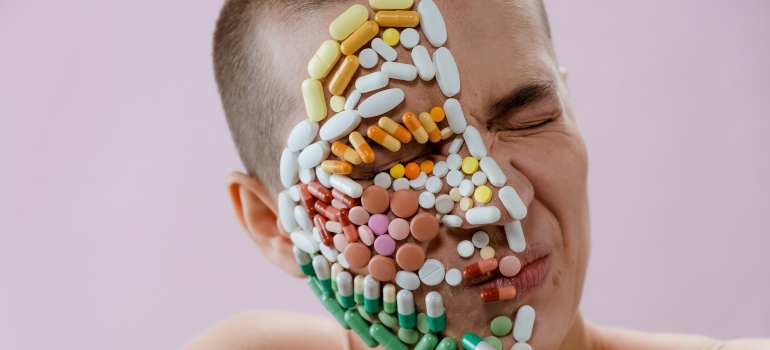Addiction recovery can be a challenging journey for anyone. However, studies show that women face unique needs in this process. As a gender group, women tend to have different experiences, expectations, and challenges than men when it comes to addiction and recovery. In addition, the unique needs women face in recovery are often overlooked. This is why it’s crucial to understand and address them in order to help women struggling with addiction achieve successful outcomes in rehab programs. If you are a woman or future mother reading this, don’t hesitate to contact us at Harmony Ridge Recovery Center WV. We offer not only highly-effective treatments but also a safe environment that supports your recovery journey from day one.
Addressing the shame and stigma surrounding women struggling with addiction
Shame and stigma are common barriers to women seeking addiction treatment. Women may feel guilty or embarrassed about their substance use and fear being judged by others. Shame and stigma can prevent women from seeking help and delay their recovery process. Therefore, bringing more attention to these feelings and providing a safe and non-judgmental environment is crucial for women’s recovery.

In addition, women in recovery may struggle with low self-esteem and feel disempowered. They may have experienced trauma or abuse, which can contribute to a negative self-image. Building self-esteem and empowerment can help women in recovery develop a positive self-image and improve their ability to cope with stress and triggers.
Support for mothers and pregnant women
Women who are mothers face unique challenges in addiction recovery. They may worry about losing custody of their children, and the stigma of being a “bad mother” may keep them from seeking help. Women in recovery who are mothers need support to help them navigate parenting while in recovery. This may include access to child care, parenting classes, and family therapy. It’s important to provide mothers in recovery with all the necessary resources.
Drug use during pregnancy can increase the risk of stillbirth, which occurs when the baby dies in the womb before delivery. This can be a traumatic experience for the mother and her family. Drug abuse during pregnancy can also lead to maternal death, especially if the mother has a pre-existing medical condition or if the drugs used are toxic. Therefore, it’s essential to provide support and treatment for pregnant women struggling with drug addiction to ensure the best possible outcome for both the mother and the child. Prenatal care providers can screen for substance abuse during pregnancy and provide appropriate interventions to help women quit drugs. Treatment options such as medication-assisted therapy and behavioral therapies are integral to drug rehab for pregnant women due to the lasting results achieved through them.
What do the studies say about motherhood after drug recovery?
The Substance Abuse and Mental Health Services Administration (SAMHSA) reports that mothers who participate in substance abuse treatment programs are more likely to retain custody of their children and have improved family relationships. Also, a study published in the Journal of Addiction Medicine found that mothers who received medication-assisted treatment for addiction were more likely to stay in treatment, reduce drug use, and improve their parenting skills. Furthermore, various similar studies confirm that necessary care and resources help women reclaim their lives and re-establish themselves as mothers.

Addressing trauma and mental health conditions
Women with substance use disorders are more likely to have co-occurring mental health conditions such as depression, anxiety, and PTSD. Co-occurring disorders can make addiction recovery more challenging and increase the risk of relapse. With that said, addressing these conditions through integrated treatment can improve recovery outcomes. That’s why nowadays drug rehab in Athens OH involves an individual set of treatments that can tackle all aspects of addiction women face.
Trauma-informed care and mental help
Trauma is often an underlying factor in addiction for women. Women who experience trauma are more likely to develop substance use disorders. That’s why trauma-informed care focuses on understanding the impact of trauma on a person’s mental and emotional health. Furthermore, a trauma-informed approach to addiction recovery recognizes the importance of creating a safe and supportive environment for women to heal and recover. The good news is that it’s possible to find a drug rehab center near Huntington WV that provides trauma-informed care. With the help of professionals in this field, women can have a smoother, gradual recovery journey, while addressing and overcoming the underlying causes of addiction.
Behavioral therapies for addiction
Behavioral therapies are an effective treatment approach for addiction recovery, especially for women. These therapies are designed to identify and modify negative behaviors and thought patterns that can lead to addiction. They help individuals develop coping mechanisms to deal with stress, anxiety, and triggers that can lead to substance abuse.

Cognitive-behavioral therapy (CBT) is a common behavioral therapy used in addiction treatment. It focuses on identifying negative patterns of thinking and behavior and replacing them with positive ones. Women, in particular, can benefit from cognitive behavioral therapy for substance use disorders in West Virginia as it helps them develop healthy coping mechanisms to deal with stress and anxiety that can trigger substance abuse.
Another form of behavioral therapy that can be effective for women in addiction recovery is dialectical behavior therapy (DBT). DBT focuses on regulating emotions and developing mindfulness skills. Women with a history of trauma or abuse can benefit from DBT as it helps them regulate their emotions and cope with difficult situations in a healthy way. This is why dialectical behavior therapy for addiction in WV is an integral part of rehab programs in many WV rehab facilities.
Individual and group therapies
Behavioral therapies can be delivered in individual or group settings. Group therapy can be particularly effective for women in addiction recovery as it provides a safe and supportive environment to share experiences and challenges. Group therapy sessions can focus on specific issues faced by women, such as gender roles, relationships, and parenting.
Dual Diagnosis uncovers undiagnosed mental health conditions that co-exist with drug addiction among women
Dual Diagnosis is a crucial aspect of women’s rehab programs as it addresses the underlying mental health conditions that often co-occur with addiction. Substance abuse can lead to or worsen mental health disorders, and conversely, untreated mental health conditions can fuel substance abuse. Therefore, addressing both issues simultaneously is essential for long-term recovery.
Through dual diagnosis, women in rehab receive a comprehensive evaluation of their mental health status to identify any co-occurring disorders. This evaluation includes a thorough assessment of their medical history, current symptoms, and any past treatment. Once a diagnosis is made, women can receive targeted treatment that addresses both their addiction and mental health issues. Moreover, women in rehab with co-occurring disorders may need longer and more intensive treatment than those with addiction alone. Dual Diagnosis programs often provide a supportive and structured environment that caters to their unique needs. They may also incorporate family therapy, vocational training, and other resources to help women build a fulfilling life in recovery.
Cultural and societal pressures
Discrimination and sexism can take many forms, including a lack of access to healthcare, employment, and education opportunities. This can contribute to stress and trauma for women, making them more vulnerable to substance abuse. In addition, women may face pressure to meet gender norms and expectations, which can also impact their mental health and well-being. Women who are members of marginalized communities may face additional challenges due to systemic racism and other forms of oppression.
Addressing these factors in addiction treatment is essential to help women achieve long-term recovery. Healthcare providers need to be aware of the impact of societal issues on women’s addiction and recovery and tailor their treatment plans accordingly. For example, therapy sessions may need to focus on building coping mechanisms to address stress and trauma related to discrimination and sexism. Additionally, healthcare providers may need to provide resources for women who have experienced trauma, such as sexual assault or domestic violence, which can contribute to substance abuse.
Moreover, providing support for cultural and social identity is crucial in addiction treatment for women. Women may face pressure to assimilate into dominant cultural norms, which can impact their mental health and well-being. Providing a safe and inclusive environment that recognizes and celebrates diverse cultures can help women feel supported and understood. For example, healthcare providers may offer group therapy sessions that focus on issues specific to women from different cultural backgrounds.
Addressing body image and eating disorders
Many women who struggle with addiction also experience body image and eating disorders. The two conditions can be intertwined, and the use of substances (like cocaine or prescription stimulants) to manage weight and body image issues can lead to addiction, further worsening these conditions. Moreover, addiction and body image issues may also stem from underlying trauma and negative self-image.

It’s, therefore, crucial to address these issues in treatment to improve the overall health and well-being of women. Treatment providers should assess whether women with addiction have an eating disorder and provide support to establish healthy eating habits. For women with eating disorders and an addiction to benzodiazepine, benzo rehab in WV (and other treatment plans) includes specialized therapy that focuses on developing a positive relationship with food and body image can be beneficial.
To further promote well-being, incorporating physical activity into cocaine addiction rehab can be helpful for women who experience body image issues. Regular exercise can boost self-esteem, body image, and overall well-being. It can also provide a healthy outlet for stress and anxiety, ultimately reducing the risk of relapse.
Support for LGBTQ+ women
Again, one of the major barriers LGBTQ+ women face in addiction recovery is stigma. They may be hesitant to disclose their sexual orientation or gender identity due to fear of discrimination, leading to a lack of understanding and support from their treatment providers. In addition, they may face additional stressors such as social isolation, rejection, and lack of familial support, which can exacerbate their addiction and mental health issues.
To address these barriers, LGBTQ+ women-specific addiction recovery programs have emerged, offering a safe and supportive environment for women to recover from addiction. These programs provide a welcoming space where women can share their experiences, build a sense of community, and receive tailored treatment that takes into account their unique needs.

Moreover, these programs aim to address the intersection of addiction and LGBTQ+ issues by providing specialized support and resources that address discrimination and stigma. This includes access to culturally competent and affirming treatment providers, education on LGBTQ+ issues, and resources for building healthy relationships.
Access to various rehab insurance coverage options
Women struggling with addiction often face barriers to accessing the necessary resources and support to achieve long-term recovery. One of the significant challenges is limited access to comprehensive rehab insurance coverage plans. Therefore, ensuring that women have easy access to a wide range of rehab insurance coverage plans is crucial to support their recovery journey.
One of the reasons women may struggle to access appropriate rehab insurance coverage plans is gender bias in healthcare. Women’s health issues are often overlooked or dismissed, leading to a lack of coverage for addiction treatment. This can further compound the financial burden of seeking treatment, which can deter women from seeking the help they need.
To address this issue, insurance companies need to offer comprehensive rehab insurance coverage plans that cater to women’s unique needs. This includes coverage for a wide range of treatment modalities, including medication-assisted treatment, various therapies, counseling, and support groups. Furthermore, insurance plans should also provide coverage for specialized services such as childcare, family therapy, and trauma-informed care. Moreover, women should be able to access rehab insurance coverage plans that offer flexible payment options to meet their financial needs. This includes options such as sliding scale fees, payment plans, and scholarships to reduce the financial burden of seeking treatment.

Fulfill the unique needs women face in recovery with Harmony Ridge
With more attention to the unique needs women face in recovery, there’s a chance to help them maintain long-term sobriety and live fulfilling lives. Addressing societal and cultural pressures, stigma, and lack of resources is crucial to achieving this goal. Additionally, by providing targeted resources and support, women in recovery can overcome these barriers and build a healthy, fulfilling life in sobriety.



